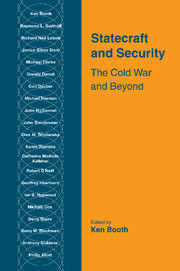Book contents
- Frontmatter
- Contents
- List of contributors
- Preface
- Introduction
- Part one Cold War: lessons and legacies
- Part two Post-Cold War: powers and policies
- 5 Can the United States lead the world?
- 6 Can Russia escape its past?
- 7 Imperialism, dependency and autocolonialism in the Eurasian space
- 8 Western Europe: challenges of the post-Cold War era
- 9 Europe and the wider world: the security challenge
- 10 A new Japan? A new history?
- 11 New China: new Cold War?
- 12 Africa: crisis and challenge
- 13 Of medium powers and middling roles
- Part three Beyond: resistances and reinventions
- Conclusion: security within global transformation?
- Index
9 - Europe and the wider world: the security challenge
Published online by Cambridge University Press: 06 October 2009
- Frontmatter
- Contents
- List of contributors
- Preface
- Introduction
- Part one Cold War: lessons and legacies
- Part two Post-Cold War: powers and policies
- 5 Can the United States lead the world?
- 6 Can Russia escape its past?
- 7 Imperialism, dependency and autocolonialism in the Eurasian space
- 8 Western Europe: challenges of the post-Cold War era
- 9 Europe and the wider world: the security challenge
- 10 A new Japan? A new history?
- 11 New China: new Cold War?
- 12 Africa: crisis and challenge
- 13 Of medium powers and middling roles
- Part three Beyond: resistances and reinventions
- Conclusion: security within global transformation?
- Index
Summary
Europe and intervention after the Cold War
In a volume on international security it can no longer be taken for granted that Europe has any right to be treated as an actor of dominating importance. The end of the Cold War has de-emphasised the role of NATO in world affairs. Global security is no longer primarily affected by the relationship between NATO and the Warsaw Pact. Rather the foci of attention now are the Security Council, its permanent members individually, a number of regional bodies, of which NATO and the European Union are but two, and the many crisis-ridden parts of the world which cry out for assistance.
Europe none the less has a considerable amount to offer as a supporter of security elsewhere. It is not, nor is it ever likely to be again, the principal provider of forces and resources for foreign military intervention as it was for so long between the fifteenth and twentieth centuries. The battering its component states gave to each other in the two world wars severely attenuated its long-held and formidable capacity to reach out and rearrange affairs in the Middle East, Africa, Asia, the Pacific and Latin America. Since 1945 it has been the United States which has borne the principal burden of leadership and commitment in international security affairs, chiefly by example. In the case of the Gulf War we saw another mighty intervener – although with resources not military contingents –in Japan.
- Type
- Chapter
- Information
- Statecraft and SecurityThe Cold War and Beyond, pp. 194 - 208Publisher: Cambridge University PressPrint publication year: 1998



